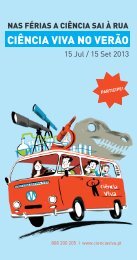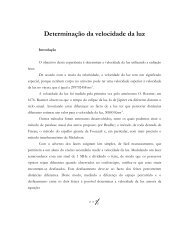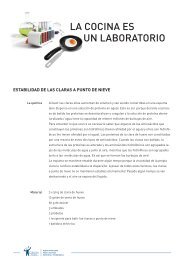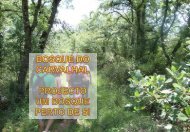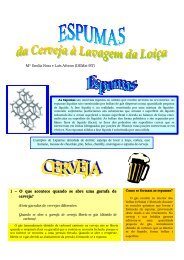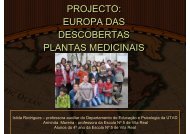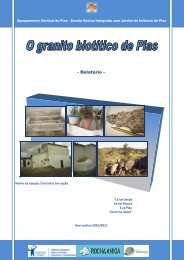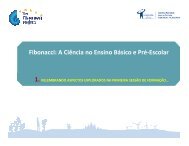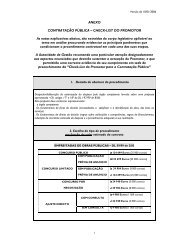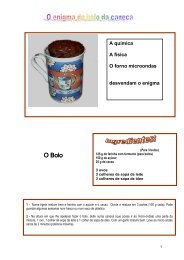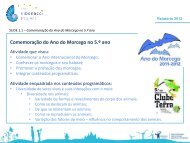Professional Development - Ciência Viva
Professional Development - Ciência Viva
Professional Development - Ciência Viva
You also want an ePaper? Increase the reach of your titles
YUMPU automatically turns print PDFs into web optimized ePapers that Google loves.
German National Conference of the SciencEduc Program: “Science is Primary”The German national conference was held on the 27th and 28th of September 2005and was organised by Dr. Petra Skiebe-Corrette (German representative ofSciencEduc, Freie Universität Berlin) in cooperation with the Berlin-BrandenburgAcademy of Sciences and Humanities (Dr. Karin Elisabeth Becker, responsible forinternational relationships at the Academy). The Academy is located in the center ofBerlin, so the conference was held in the lecture halls at the Academy. The invitedparticipants in the conference included primary school principals and teachers,scientists, and people working in the school administration. The conference wasopened by Dr. Skiebe-Corrette as the German representative of SciencEduc, thevice president of the Freie Universität Berlin Prof. Helmut Keupp, and Prof. RandolfMenzel representing the Berlin-Brandenburg Academy.In order to inform the German public about the best practice model programs existingin Europe and the USA which use inquiry-based learning to teach science,representatives of three of such programs were invited by Dr. Skiebe-Corrette to givea presentation at the conference:- Prof. Pierre Léna (Mitglied der Académie des Sciences, Paris): La main à la pâte- Kerstin Reimstad (Coordinator, Science and Technology for All Program, TheRoyal Swedish Academy of Sciences/ The Royal Swedish Academy ofEngineering Sciences, Stockholm): Science and Technology for All- Prof. Smith Holt (Consultant of the National Science Resources Center, TheNational Academies–Smithsonian Institution, Washington DC): Science andTechnology for Children.In Germany, inquiry-based learning of children is often found in informal sciencelaboratories, which also play an increasing role in teacher training. Prof. KatharinaKohse-Höinghaus (Universität Bielefeld, Physikalische Chemie I, head of the informalscience laboratory teutolab) represented one of the over 100 existing informalscience laboratories. The teutolab was one of the first informal science laboratoriesfounded and was one of the first to focus on primary school pupils.In order to involve the federally organised school system in Germany, tworepresentatives from different federal states (Berlin and Brandenburg) were alsopresent, reporting on the status of science teaching in their primary schools:



